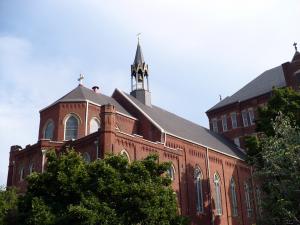
Catholic Social Teaching should be used by Catholic schools and universities. Instead, many of them have a history of ignoring, or outright rejecting, the rights Catholic teaching demands to be given to workers. When Catholic schools ignore Catholic teachings, and are sued by workers because their rights have been ignored, it takes a great amount of hubris to tell the government to stay out of such disputes because of “religious liberty.” This is mockery of religious liberty. How can religious liberty be a defense for Catholic schools, when those suing the schools are promoting Catholic teaching? It is rather an abuse of religious liberty. And how do they justify this? By suggesting religious liberty means there can be no governmental oversight over any religious community (which is an absurd claim, as laws against human sacrifice demonstrate).
We see within the United States many Catholic schools going against their own teachings. Various law suits demonstrate this. For example, in California, there is the question of whether or not religious organizations can be sued for labor violations; the appeals court said that religious liberty meant they could not be sued. Lawrence Hurley, reporting on this case after it has been picked up by the Supreme Court, gives us the details:
The U.S. Supreme Court on Wednesday agreed to decide the extent to which religious organizations are immune from lawsuits filed by employees in two cases involving teachers at Catholic schools in California who sued after losing their jobs.
One case involves teacher Agnes Morrissey-Berru, who filed a lawsuit against Our Lady of Guadalupe School in Hermosa Beach after her contract was not renewed in 2015 over what the school said were concerns about her performance. Morrissey-Berru sued, accusing the school of age discrimination.
In the other case, teacher Kristen Biel sued St. James School in Torrance after her contract was not renewed in 2014 while she was being treated for breast cancer. She has since died and the case is being pursued by her widower, Darryl Biel.”[1]
What Catholic institution would fire someone who needs medicine, putting their healthcare in jeopardy? How is this pro-life? How is this anything but putting profit over lives? As the suit indicated, her firing went against the American with Disabilities Act. How can a Catholic institution promote such discrimination against someone who was in need, especially when Catholic teaching recognizes healthcare is a right? Once again, it is an absurdity to suggest that religious liberty means religious institutions can go against basic human rights, but it is even more absurd when those rights are themselves promoted by the religion behind the institution trying to ignore them.
Likewise, then, when a Court of Appeals in the District of Columbia ruled in favor of Duquesne against adjuncts trying to unionize , John Garvey, the President of Catholic University of America, defended this policy by a terrible slippery slope argument. He suggested that The National Labor Relations Board (N.L.R.B) really wanted to destroy religious education by placing demands on what was taught:
The N.L.R.B. (i.e., the government) imagines that it can carve the universe of higher education neatly into secular and religious parts. If it had its way, it would claim authority to oversee course loads, the manner of teaching, the teachers’ obligation to counsel students, and other terms and conditions of employment for all faculty, excepting only those specifically charged with “propagating religious tenets, or engaging in religious indoctrination or religious training.” [2]
Of course, the case had nothing to do with what was being taught in the school, but rather how the school treated its employees, making sure employees had their basic civil rights protected – rights which Catholic teaching itself affirms must be protected. One wonders who is actually involved with the promotion of anti-Catholic propaganda here? What, exactly, is being taught in Busch School of Business in regards just wages, worker rights, and unions?
There should be no argument made by Catholics suggesting that governments have no role in protecting civil society. Workers at Catholic institutions are a part of civil society. Their rights must be protected. If a particular Catholic institution tries to use religious liberty as a just explanation for the exploitation of workers (as well as for denying health care and other necessities promoted by Catholic teaching), then religious liberty becomes a tool for exploitation instead of the liberty. This is far from what religious liberty is about. Religious liberty does not say there can be no governmental oversight of religious institutions (otherwise, those who wanted to engage in human sacrifice could not be stopped). Even the earliest apologists for the Christian faith, in their promotion of religious liberty, said that if Christians were shown to be doing wrong, Roman authorities would be correct in punishing them for such wrong doing.
The irony of Catholic schools trying to go against Catholic teaching on social justice was noted by Judge Richard J. Cardamone in 1985, when he ruled in favor of the New York State Labor Relations Board against the New York Catholic High School Association, as Cindy Currence explains:
Judge Cardamone also noted in the circuit court’s opinion that encyclicals and other Papal messages have made it clear that the Catholic Church has for nearly a century been among the staunchest supporters of the rights of employees to organize and engage in collective bargaining.[3]
Even if one wanted to make a claim that the government was violating the separation from church and state by demanding the church to act in a certain way, in reality, it could only be a violation if the government demanded the church to act against its own deeply-held teachings. Demanding respect be shown to workers, giving them the right to unionize, making sure they had just wages and proper health care and were not simply fired without just cause cannot violate the religious liberty of Catholics because it is official Catholic teaching that such rights must be protected. Vatican Council II in Gaudium et spes decreed that any rejection of such rights was inhuman:
Since economic activity for the most part implies the associated work of human beings, any way of organizing and directing it which may be detrimental to any working men and women would be wrong and inhuman. It happens too often, however, even in our days, that workers are reduced to the level of being slaves to their own work. This is by no means justified by the so-called economic laws. The entire process of productive work, therefore, must be adapted to the needs of the person and to his way of life, above all to his domestic life, especially in respect to mothers of families, always with due regard for sex and age. [4]
St. John Paul II pointed out that when workers are not offed a just wage, then the particular socioeconomic system which allows for such an abuse has failed one of the fundamental tests used to indicate whether or not it is just:
Hence, in every case, a just wage is the concrete means of verifying the justice of the whole socioeconomic system and, in any case, of checking that it is functioning justly. It is not the only means of checking, but it is a particularly important one and, in a sense, the key means. [5]
Adjuncts in Catholic universities are exploited for their labor; they are being told they cannot unionize to promote their own needs; and the government now says that it cannot engage those universities and demand them to follow basic labor laws. How does this not demonstrate a failure of the system, and therefore, indicate the need for change – from the university – but also from the government which established such a false justification for exploitation? Catholic institutions must be expected to follow Catholic teaching in regards workers’ rights, including the right to unionize:
Among the basic rights of the human person is to be numbered the right of freely founding unions for working people. These should be able truly to represent them and to contribute to the organizing of economic life in the right way. Included is the right of freely taking part in the activity of these unions without risk of reprisal. Through this orderly participation joined to progressive economic and social formation, all will grow day by day in the awareness of their own function and responsibility, and thus they will be brought to feel that they are comrades in the whole task of economic development and in the attainment of the universal common good according to their capacities and aptitudes. [6]‘
Unions are one of the major ways in which workers are able to come together and overcome the imbalance of those who have money and power in the work place. They help prevent economic slavery. They give protections so as to make sure work was not merely controlled by the rich and powerful, a control which St. John XXIII thought would undermine the dignity of workers:
We therefore consider it Our duty to reaffirm that the remuneration of work is not something that can be left to the laws of the marketplace; nor should it be a decision left to the will of the more powerful. It must be determined in accordance with justice and equity; which means that workers must be paid a wage which allows them to live a truly human life and to fulfill their family obligations in a worthy manner.[7]
Low value is being given to adjuncts. St. John Paul II decried such mistreatment by saying it is a scourge which must be overcome:
And the “poor” appear under various forms; they appear in various places and at various times; in many cases they appear as a result of the violation of the dignity of human work: either because the opportunities for human work are limited as a result of the scourge of unemployment, or because a low value is put on work and the rights that flow from it, especially the right to a just wage and to the personal security of the worker and his or her family.[8]
How, then, can Catholic institutions justify themselves when they go against the basic human rights which the Catholic church teaches workers must possess? How can they be using “religious liberty” as an excuse to violate basic human rights, when they would oppose “religious liberty” being used by people who promoted abortion as justification for its use? It is the kind of duplicity and dishonesty which discourages not only Catholics, but outsiders who only see Catholics promoting grave violations of human dignity.
Religious liberty is an important part of civil society. However, religious liberty is not, as some might want to suggest, a purely “hands off” approach to religion and religious institutions. It never has been that. It has always been understood that basic human rights must be protected, and if particular religious faiths undermined those rights through the promotion of outrageous injustices, religious liberty would never defend their right to act against the common good. Catholic institutions trying to use religious liberty as an excuse to go against basic human rights which the Catholic church promotes make a mockery not only of religious liberty but the Catholic faith as a whole.
[1] Lawrence Hurley, “U.S. Supreme Court Takes Up Bid by Catholic Schools to Avoid Worker Lawsuits,” in Reuters (12-19-2019).
[2] John Garvey, “Catholic Colleges Finally Win Independence From the Federal Labor Board” in America (2-6-2020).
[3] Cindy Currence, “Religious Schools Required to Bargain” in Education Week (1-23-1985).
[4] Gaudium et spes. Vatican translation. ¶67.
[5] St. John Paul II, Laborem Exercens. Vatican Translation. ¶19.
[6] Gaudium et spes, ¶68.
[7] St. John XXIII, Mater et Magistra. Vatican translation. ¶71.
[8] St. John Paul II, Laborem Exercens, ¶8.
Stay in touch! Like A Little Bit of Nothing on Facebook.
If you liked what you read, please consider sharing it with your friends and family!












